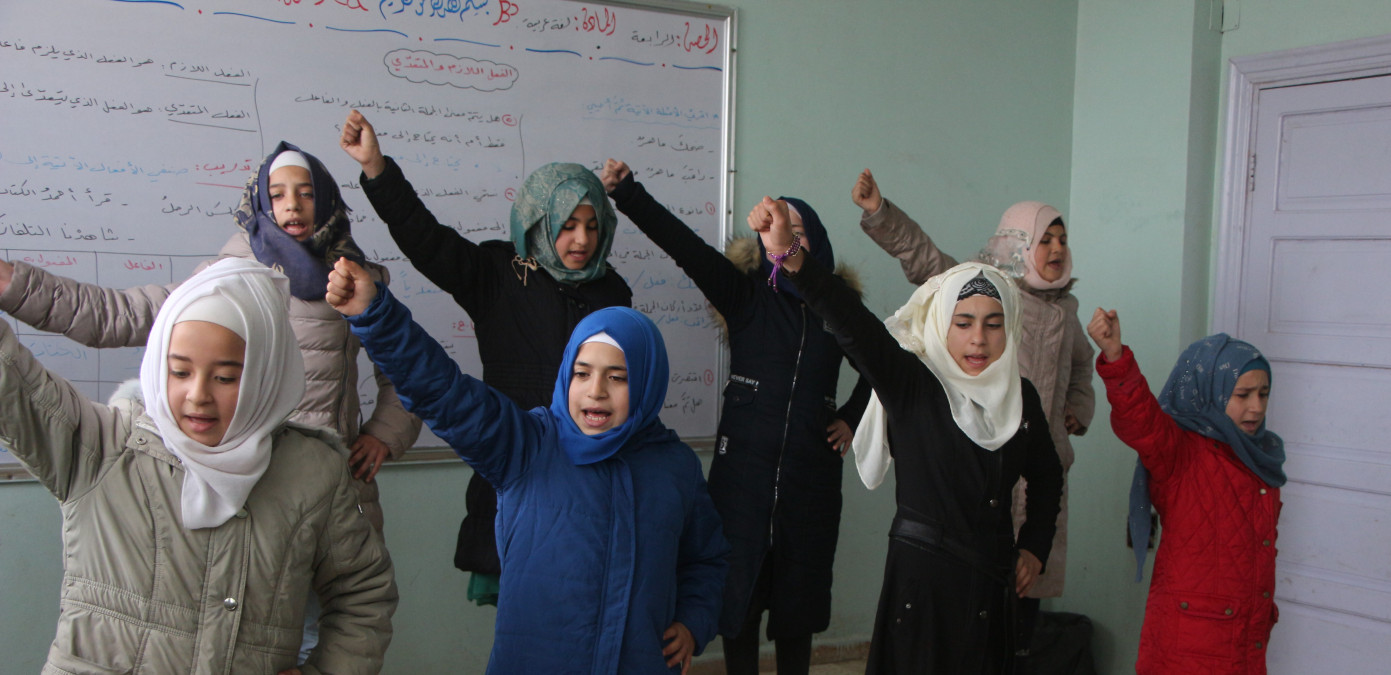Using education, rhymes, and rhythms to cope with an endless war
Published: Mar 20, 2020 Reading time: 4 minutes Share: Share an articleTwelve-year-old Aya sleeps with her six siblings in one room, the same room they use for eating, playing, and doing homework. Life has not been easy for Aya, who lost her father when she was only three days old. Her mother remarried, but the family was forced from their home in Aleppo, Syria, when the war broke out in 2012. Together with her stepfather and grandparents, Aya and her family had to start over in a small village.

But Aya is more than the sum of her circumstances. She is bright, outgoing, and caring, and very close to her family. “I love all of them,” she says of her siblings and half-siblings.
Apart from her family, Aya has two other loves: poetry and school. “I never need to tell Aya to study,” explains her teacher, Omar, who has taught Aya since the fourth grade.
A difficult place to learn
However, Idlib province in northwest Syria is a precarious place to think about the future. Aya’s school was hit in an airstrike a few years ago, something the students still struggle to forget. “A week ago, a bomb hit a neighboring village,” Omar recalls. Although the students were evacuated, it made everyone nervous about returning to school.
Many of Omar’s students have lost at least one parent in the fighting. When the conflict first disrupted the education system in Idlib province, Omar taught on a volunteer basis for three years. People in Need supported Aya’s school with funding from the British government, which allowed teachers like Omar to continue providing an education.
Aya, however, has remained focused on her studies and her poetry (as well as her ambition of become a doctor one day). Her fifth-grade marks showed just how determined she is: Aya scored a perfect 200 out of 200. “Once, she got 9.5 out of 10 on an exam and she was very sad!” laughs her stepfather, Hussam.
Assistance has an impact
Omar sees big differences in his students once they receive help with their learning. Their academic progress, along with any psychosocial support activities they participate in, “boost their self-confidence and morale,” he says. “If a student is not prepared psychologically to sit through a lesson, they will not learn it well.”
In Aya’s case, psychosocial support has made her even more determined and has increased her social maturity. “She has a really strong character; she is very sociable despite being strict and serious,” says Omar. “She loves her friends and they love her back, and she ignores the nonsense and trivialities that children her age are keen on,” says Omar. In fact, Omar believes it is Aya’s maturity and leadership skills that have helped her cope with her past and with the brutal context in which she is growing up.
Thriving through poetry
Aya also turns to poetry to help navigate her challenging circumstances. When she was younger, Aya only knew the verses she memorized from her schoolbooks. But she started chanting them under her Arabic teacher’s supervision, and soon, her talent and ambition quickly outpaced what the courses alone could offer. So Aya began learning other poems replete with wisdom and proverbs, like this one, by Imam Al-Shafi’i:
دع الأيام تفعل ما تشاء
وطب نفسا إذا حكم القضاء
Let the days do whatever they want
and be satisfied if destiny judges
It was her teacher Omar’s guidance and motivation that encouraged her to unleash her creativity and start writing poetry herself. Now she chants beautiful rhymes in Arabic, such as:
أنا في الصبح تلميذ وبعد الظهر نجار
فلي قلم وقرطاس وإزميل ومنشار
In the morning I am a student and in the afternoon a carpenter
So, I hold a pen and stationery and a chisel and a saw
أنا في الصبح تلميذ وبعد الظهر فلاح
أزرع خضرة شتى ورمان وتفاح
In the morning I am a student and in the afternoon a peasant
I plant many vegetables and pomegranate and apples
Almost nine years into the war in Syria, almost two million school-aged children are out of school and one in three schools have been damaged by the fighting. Thanks to UK aid from the UK government, People in Need has been providing a holistic package of support in Syria, from teacher training and furniture for classrooms, to kits to help schools stay open and provide a future for Syria’s children. Over 4,000 students a year attended schools supported by the project between 2017 and 2019, and 35 schools were renovated.









